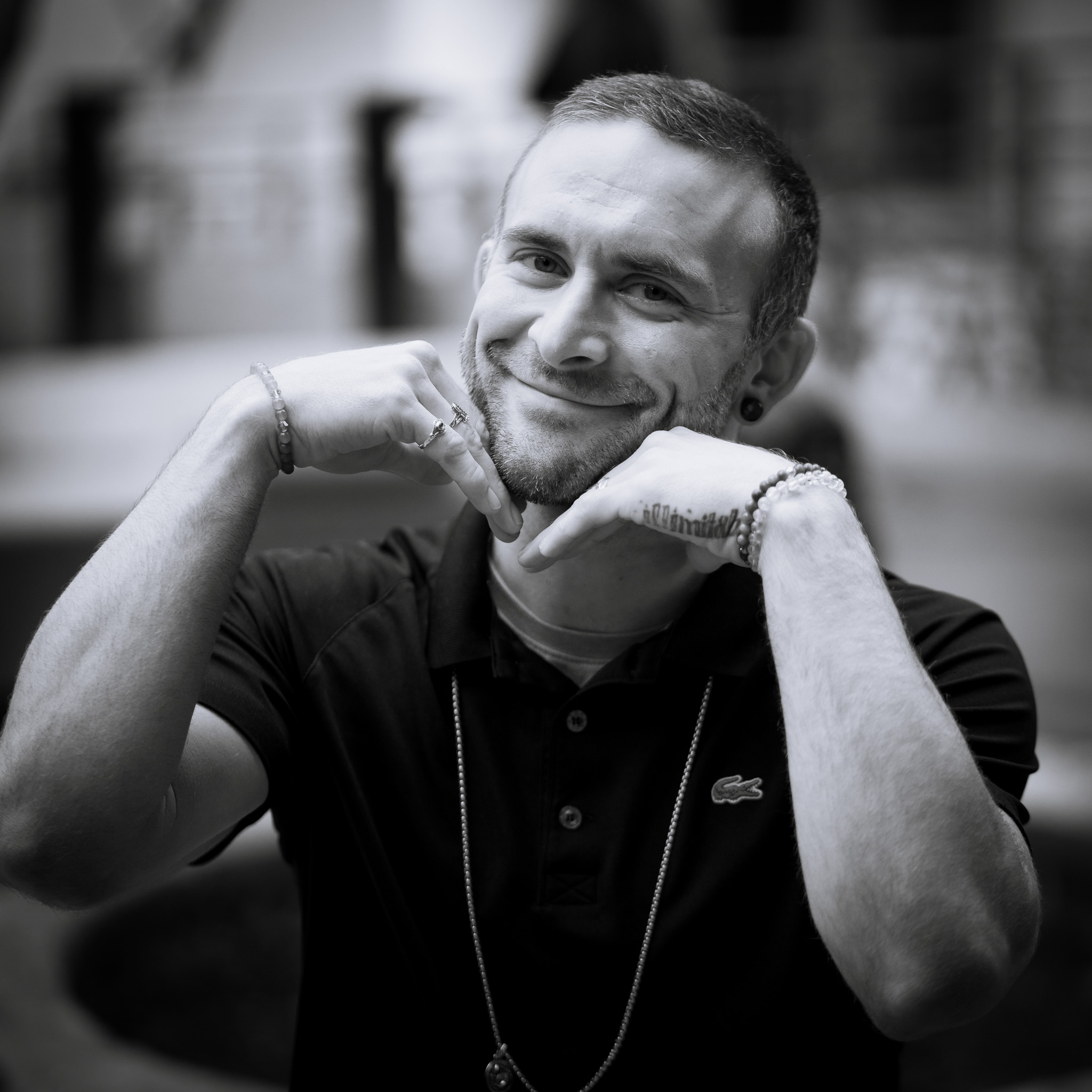Devin is a kind and vibrant soul, full of energy, charisma, and personality. If you take a moment to really look at him, you’ll notice a side of this man you may not have seen upon first glance. There is a depth and a wisdom to Devin—though as young as he may appear—when looking at him, I see a wise man, weathered through the trials and tribulations of a chaotic existence amidst a tragically material world. One thing that does strike me about Devin is how easily you can tell he has been fighting his war…and fighting for some time. But it truly does feel like this time he has finally emerged victorious. His confidence is inspiring, and his passion, contagious. Without a doubt, Devin is about to enter a new era of what it means to truly be Devin, and at the core of that drive and inspiration—the BTS Community.
“I was living in a fog,” Devin says, pausing as if still amazed by how clear things have become. “For a long time, I thought I was just lost—but now I know I was being found.” Devin’s journey to Beit T’Shuvah wasn’t just about sobriety; it was about rediscovery. There’s a radiant humility when Devin talks about his process—not the kind that comes from defeat, but from awakening. He laughs about the moments of resistance, the ego battles in group, the inner voice that told him he was different, “I thought no one could understand me. Turns out, that was the point—I didn’t understand myself.”
Devin grew up in Las Vegas; his childhood was marked by contrasts: the city’s bright lights and endless parties, and the quiet, heavy responsibilities at home. Adding to the complexity of his early years, Devin witnessed domestic abuse between his mother and her then-husband, “She divorced him when I was in third grade, then we moved to Summerlin, and she started dating my—now I call him my dad—but my stepdad”.
His sister, severely disabled with microcephaly and cerebral palsy, required constant care, which put tremendous strain on his parents, leaving little time for him and his older brother. Yet his stepfather, Domingo, brought stability. “He brought peace into our lives. He’s amazing,” Devin reflects. Despite these anchors, his life remained punctuated by constant change: he attended five different elementary schools, navigated a challenging relationship with his older brother, who was in and out of trouble with school [and presently just getting out of prison], and carried the weight of undiagnosed ADHD, which he only recently began to treat properly.
Devin recalls a spiral into substances that began with Xanax and weed in ninth grade, and escalated to ecstasy, cocaine, heroin, LSD, and meth as he grew older. His introduction to meth in his early twenties, coinciding with personal heartbreak, became a turning point. Devin moved out of his parents’ home, seeking independence, but found himself living with an older alcoholic boyfriend in Centennial Hills. Employment at Starbucks provided a semblance of routine, but alcohol remained a constant, a thread woven through periods of stability and destruction. He describes the pivotal moment that altered his life trajectory, “I was 20, I got my heart broken, and then meth was there. It was so random, we smoked a ton, and it was fucking crazy. That completely altered the course of my life.” Soon enough, Devin began shooting meth, lost his job, which he had had since 10th grade in high school, lost his apartment, and began couch surfing.
Seeking a way out, Devin left Vegas for Billings, Montana, hoping that distance from the chaos of his old life might allow him to get clean. And he did…from the drugs, but the alcohol remained. The time in Montana was a mix of clarity and struggle. Surrounded by wide-open landscapes, he confronted himself in a way that Las Vegas never allowed. Yet sobriety was not linear. After a period of relative stability, he returned to Las Vegas, holding down a management job—but the weight of old habits followed him. Drinking at work became a dangerous crutch, and eventually, he was fired. “I thought I had it together, but I was drinking on the job. That ended it pretty quickly.
After moving to Los Angeles, he later became the assistant manager of a Drybar in Brentwood, a position that represented both career growth and an opportunity to establish independence. However, despite periods of professional success—including securing an apartment and achieving career milestones—alcohol use remained a constant undercurrent. Devin also worked at a hotel in Beverly Hills, a role he described as “depressing.” By August of that year, chronic drinking led to repeated tardiness, ultimately resulting in his termination. These professional setbacks were intertwined with his substance use, illustrating how addiction disrupted not only personal life but also the stability and growth he sought in his career.
Despite these challenges, Devin demonstrated resilience; he even managed to help one of his friends get sober, and in karmic turn, Robert, that same friend, proved instrumental in his own journey to recovery. His first experience at Beit T’Shuvah, during the COVID-19 pandemic, planted a seed of change. Though the program was limited by pandemic restrictions, it offered structure, mental detoxification, and support, laying a foundation for sobriety. Devin gained employment, secured an apartment, and experienced what it felt like to take steps toward a healthier life. Yet, upon leaving, he eventually returned to alcohol use, recognizing that true change required deeper commitment.
After some years revisiting the same problems, it was his second stay at BTS that became truly transformative on a profound level. While Devin was in detox in Tarzana in early March, he learned he was being accepted back into Beit T’Shuvah. Sarah Jacobs, in particular, represents an important pillar in this community for Devin, and she was instrumental in ensuring he had a second chance at recovery here at BTS. It’s easy to see how much of an impact her friendship has had on his journey, and it just goes to show how personal and important the relationships are here between staff and residents. Devin mentions how many of the current senior staff team were actually going through the program his first time around, and years later, to see so many of them in senior positions here at BTS as official employees had an inspiring impact on his experience.
In an in-house meeting, one moment crystallized his desire for lasting change, “this guy said none of his friends or family will ever be as proud of him as he is of himself. And I just thought, ‘God, it’d be nice to feel that way about myself, wouldn’t it be fucking sick if I had that chapter in my story where I finally got it and life gets better?’”
So, guided by his sponsor, Ethan, Devin dove in headfirst. “I did all the steps, and it was really powerful. Going through those steps really was a thing. It was transformative,” he says. Devin learned that recovery is a living process—not a checklist, not a temporary fix, but a full embrace of self-awareness, accountability, and healing.
Through BTS, Devin has discovered both community and personal agency. “Being part of the community doesn’t mean you’re out on the patio hanging out with everyone. Sometimes it’s just stopping someone in the hall and being like, ‘Hey, are you doing all right? I know that a lot of people here would show up for me, and I would show up for them, too. Thank God for the community here—I feel supported. For sure. Hell yeah.”
Devin’s metaphysical nature—his bracelets (which he creates himself), astrology, and intuitive energy—intersects with his recovery journey. His sensitivity, once a source of depression, now serves as a compass for empathy, connection, and self-reflection. He has embraced professional and personal milestones at BTS, celebrating joining the staff at the Thrift Shop as an official employee, “I’m excited! It’s crazy that I’m an employee for BTS now!” He also lives in staff housing, solidifying the next chapter of his recovery.
Devin’s journey is one of resilience, introspection, and transformation. He has navigated the chaos of addiction, the weight of family complexity, and the unpredictability of life—and emerged with clarity, passion, and gratitude. He has found a rhythm between his metaphysical curiosity, his deep intuitive empathy, and his commitment to sobriety. At the core of his drive and inspiration is the Beit T’Shuvah community: a living testament to the power of connection, compassion, and renewal.
In the community, he found reflection. In structure, he found freedom, “I used to think freedom meant doing whatever I wanted. Now I realize freedom is peace of mind. It’s being able to show up for people. ” Wise words. His days now are colored with gratitude—genuine, earned gratitude. Devin talks about his sponsor, his peers, his growing spiritual practice, and the quiet mornings when he just sits and breathes, “The stillness used to scare me. Now it feels like home.”
Witnessing Devin now, there’s an unmistakable glow—a man learning not only how to rebuild but how to live beautifully, “BTS gave me a second chance,” he says with conviction, “But really, it gave me myself back.” It’s clear that this new chapter for Devin isn’t a conclusion—it’s an opening—a life fully lived, fully felt, and shared with others walking their own road toward truth. A beginning.

